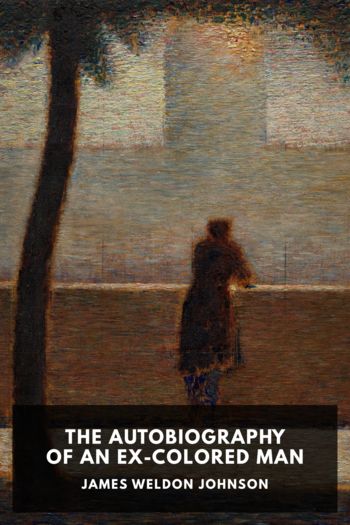The Autobiography of an Ex-Colored Man, James Weldon Johnson [best books to read in life .TXT] 📗

- Author: James Weldon Johnson
Book online «The Autobiography of an Ex-Colored Man, James Weldon Johnson [best books to read in life .TXT] 📗». Author James Weldon Johnson
Through my music teaching and my not absolutely irregular attendance at church, I became acquainted with the best class of colored people in Jacksonville. This was really my entrance into the race. It was my initiation into what I have termed the freemasonry of the race. I had formulated a theory of what it was to be colored; now I was getting the practice. The novelty of my position caused me to observe and consider things which, I think, entirely escaped the young men I associated with; or, at least, were so commonplace to them as not to attract their attention. And of many of the impressions which came to me then I have realized the full import only within the past few years, since I have had a broader knowledge of men and history, and a fuller comprehension of the tremendous struggle which is going on between the races in the South.
It is a struggle; for though the black man fights passively, he nevertheless fights; and his passive resistance is more effective at present than active resistance could possibly be. He bears the fury of the storm as does the willow tree.
It is a struggle; for though the white man of the South may be too proud to admit it, he is, nevertheless, using in the contest his best energies; he is devoting to it the greater part of his thought and much of his endeavor. The South today stands panting and almost breathless from its exertions.
And how the scene of the struggle has shifted! The battle was first waged over the right of the Negro to be classed as a human being with a soul; later, as to whether he had sufficient intellect to master even the rudiments of learning; and today it is being fought out over his social recognition.
I said somewhere in the early part of this narrative that because the colored man looked at everything through the prism of his relationship to society as a colored man, and because most of his mental efforts ran through the narrow channel bounded by his rights and his wrongs, it was to be wondered at that he has progressed so broadly as he has. The same thing may be said of the white man of the South; most of his mental efforts run through one narrow channel; his life as a man and a citizen, many of his financial activities, and all of his political activities are impassably limited by the ever present “Negro question.” I am sure it would be safe to wager that no group of Southern white men could get together and talk for sixty minutes without bringing up the “race question.” If a Northern white man happened to be in the group, the time could be safely cut to thirty minutes. In this respect I consider the conditions of the whites more to be deplored than that of the blacks. Here, a truly great people, a people that produced a majority of the great historic Americans from Washington to Lincoln, now forced to use up its energies in a conflict as lamentable as it is violent.
I shall give the observations I made in Jacksonville as seen through the light of after years; and they apply generally to every Southern community. The colored people may be said to be roughly divided into three classes, not so much in respect to themselves as in respect to their relations with the whites. There are those constituting what might be called the desperate class—the men who work in the lumber and turpentine camps, the ex-convicts, the barroom loafers are all in this class. These men conform to the requirements of civilization much as a trained lion with low muttered growls goes through his stunts under the crack of the trainer’s whip. They cherish a sullen hatred for all white men, and they value life as cheap. I have heard more than one of them say: “I’ll go to hell for the first white man that bothers me.” Many who have expressed that sentiment have kept their word, and it is that fact which gives such prominence to this class; for in numbers it is only a small proportion of the colored people, but it often dominates public opinion concerning the whole race. Happily, this class represents the black people of the South far below their normal physical and moral condition, but in its increase lies the possibility of grave dangers. I am sure there is no more urgent work before the





Comments (0)